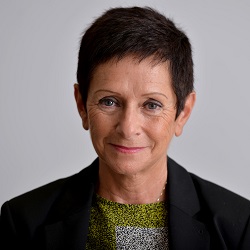

This interview with Yvonne Wedel-Andersen, Head of Operations at Bibby Financial Services Limited, was originally published in the Summer 2019 edition of World Trade Matters.
How long have you been a member of the Institute of Export & International Trade?
My diploma bears the date 7th October 1992. The UK had just left the ERM on ‘Black Wednesday’, there was discontent within Government and the electorate were unhappy. More than a quarter of a century on, although it may feel like not much has changed, there have been pivotal moments in the growth of UK exports which have increased 2.3% month-over-month to a record high of £54.66 billion in January 2019.
What are you doing at the moment in the world of international trade?
I work for the UK’s largest independent invoice financier, Bibby Financial Services, as Head of Operations, Export Finance. We support exporters with flexible working capital solutions on either a disclosed or undisclosed basis. 2018 was an excellent year for us and, notwithstanding Brexit, we continue to fund our clients in these uncertain times, giving them one less thing to worry about.
How do you work with the Institute in helping businesses enter international trade?
We support both experienced businesses and those new to exporting including new businesses. Often the areas that get forgotten in the exciting moment of a first overseas order are extended payment terms, delivery options i.e. (incoterms), the documentation that may be required in support of the export and ‘how to get paid’.
The Institute provides some excellent introductory courses for exporters and importers and we are committed to sharing these opportunities when there is need. From a Bibby Financial Services perspective, we have recently sent all our credit controllers on the ‘Introduction to Exporting’ course so they can appreciate what it is like to stand in the, ‘exporters shoes’. We also have two colleagues taking the diploma course.
What major tips would you give for new exporters joining the Institute?
Review the new terms and conditions of sale templates. These will ensure that either the terms you have are fit for purpose or encourage you to want to use them if you don’t already.
Take a look at the ‘Doing business with’ guidebooks. They explain all the nuances of doing business in the major markets of the world and a directory of the organisations, including Government bodies, that can support exporters expanding into new markets.
Get involved. Attend networking events and meet other exporters. Join the WebEx sessions, come along to the trade summits.
Most often the best advice is based upon the practical experience of others. Involve your colleagues, we don’t think about succession every day, yet we need to start nurturing tomorrow’s export experts, today. With new trade deals to be brokered in the medium term, knowledge today will reap rewards tomorrow.
What's the biggest lesson you've learnt from your career in international trade?
I have been in the international finance industry since 1986 and, during that period, I’ve come to appreciate that sharing best practice is essential to making sure international transactions run smoothly. This means knowledge becomes an essential currency of trade. For instance, the UK exports to over 200 global markets a year, which includes the 27 EU member markets and the 36 markets which make up the OECD, all of whom have their own legal jurisdictions, commercial and local laws, customs and payment procedures.
The Institute has a strap line, ‘Exporting is Easy when you Know How’. Funders like us must understand all of the know-how of the markets and sectors our clients work in so as to mitigate the risks, both known and unknown, that may present themselves.
In 2018, BFS Export finance took assignment of £299m invoices funded across EU, OECD and non-OECD markets. Due diligence is key to success, checking that contracts and terms and conditions are fit for purpose, understood and met, that paperwork is in order, and importantly, that protection against bad debts, political and economic risk are key risk mitigants.
We’re here to offer clients our knowledge and insight to ensure they understand the potential pitfalls of trading in overseas currencies, supporting them on their journey through our learned experience.



